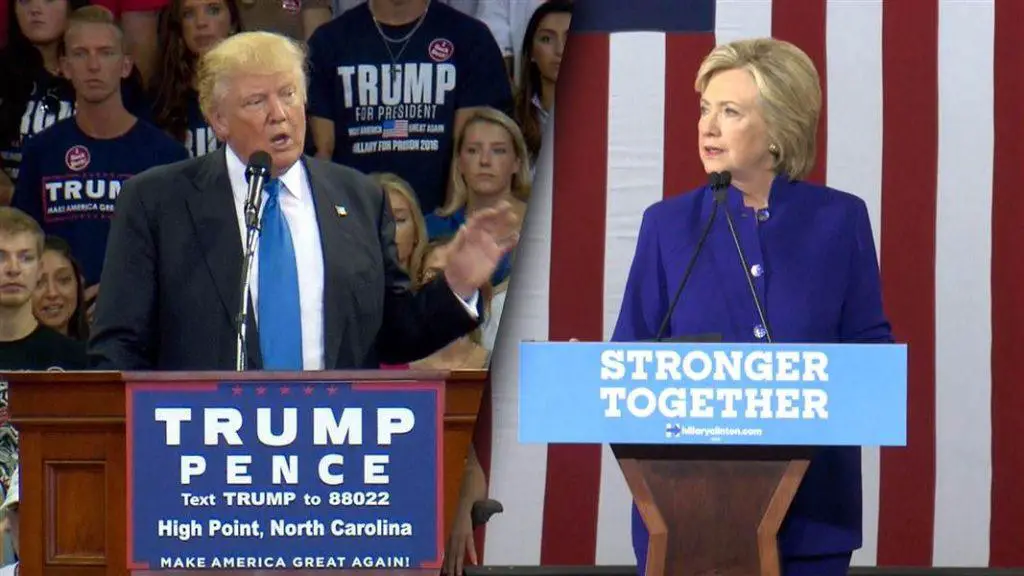A lot of money was won and lost this week—gambling on the presidential debate. Technically, most betting on politics illegal in the United States, so the online sites are located in Britain and other countries. You can bet on just about anything. For instance, the site PredictIt had a “market” in many facets of the debate.
One example is how many people would watch the debate. You could have bet on whether the debate would draw an all-time record viewership. Even though there was a lot of interest in the Obama-Romney debates in 2012, only 67.2 million watched their first debate—a long way from the Reagan-Carter debate, in 1980. A full 80.6 million watched that one. No other debate has even reached 70 million.
That’s one reason why you could have easily doubled your money by betting on it. You’d think viewership would go up every year, due to the increase in the population and number of prospective voters. But another consideration is that a lot of people have “cut the cord,” so they watched online, instead of on TV. Nielsen did include some online streaming, but it was still an open question. Final results showed that over 84 million watched Monday’s debate.
There were other details you could vote on. For example. . .
–Whether the debate would be held
–Whether Donald Trump would participate
–Whether third-party candidates would be included
–Whether Trump would say, “Crooked Hillary”
–Whether the moderator would ask about Benghazi
–Whether the moderator would ask about “pneumonia”
–Whether the moderator would ask about “baskets of deplorables”
–among a few others.
If you want a short-term bet, you can also bet on poll numbers on a certain date, fundraising totals for the month for each candidate, how much each spent, how many false statements would be made by each candidate during the month, whether any of the candidates would drop out, will Jeb Bush or John Kasich endorse Trump—and would Paul Ryan withdraw his endorsement, and whether Johnson would be above 9% and Stein would be above 3% on some date.
You can also play arbitrage, by betting on variations of the same bet. For instance, you can bet whether Trump or Clinton will win, but also, whether Kaine or Pence will win. Also, will this be the year a woman becomes president, and whether the Democrats or Republicans win the White House. If you’re good with numbers, you can bet on one candidate in one market, and another candidate in another, and reduce or eliminate risk.
There are already markets in events of next Tuesday’s (October 4) vice presidential debate. You can bet on any of these topics coming up during the debate:
–“Religious Liberty”
–“Sanctuary Cities”
–“Tax Returns”
–“Campaign Finance Reform”
–“EpiPen”
–“Obamacare”
All of the above markets are as listed in the site, PredictIt. We focus on it for two reasons: one is that it is the only site that is dedicated to politics, and another is that the format is so user-friendly. Each market is in its own box, utilizing photos of the candidates involved, with a clear current price. Other sites are dedicated to sports and are only trying to take advantage of political interest. And they use confusing charts and arcane terms to describe the offerings.
If you’re interested, here are the other popular sites:
BetFair, Bovada, PaddyPower, BetOnline, SportsBetting, FiveDimes, VegasOffshore, BookMaker, AmericanBettingSite, TopBet, Bet365</a,
BoDog, Intertops, YouWager, GTBets, HeritageSports
(Gamble at your own risk)
John Stossel helped start the site, ElectionBettingOdds.com. His site reports on the markets at PredictIt.com and BetFair.com. Here’s what he had to say on Fox News.
Want to know who the next president will be?
Don’t trust polls or pundits. Betting odds at ElectionBettingOdds.com are the best predictor of who will win any election.
Pundits have a terrible track record. Last election, Newt Gingrich and Dick Morris forecast a Romney “landslide.” Rush Limbaugh said, “All my thinking says Romney big. … It’s not even close.”
Polls are better, but not much. That’s because you are not normal. Since you read this column, you are different from most voters. You think a lot about politics. Most Americans don’t. . .
But people who bet knew better. They picked Romney. Likewise, bettors anticipated the Obama victory that many polls and pundits missed.
Despite bettors’ good track record, few people know about the odds or how they’re created. Here’s how: computers average bets made on “prediction markets,” where traders buy and sell shares — like stocks — on each candidate. As I write [last January], a share of Donald Trump winning the GOP nomination effectively costs 23 cents. If Trump wins, everyone who owns that share gets $1. That implies Trump has a 23 percent chance of winning the nomination. . .
Prediction markets have a long track record. University of North Carolina researchers found that from 1868 to 1940, prediction markets “did a remarkable job forecasting elections.” More than $100 million was bet, sometimes exceeding the value of shares changing hands on Wall Street. Newspapers ran headlines like “Betting Odds on Roosevelt Rise to 7 to 1.”
So what are the current odds at ElectionBettingOdds.com? The current betting is a 67.8% win by Hillary Clinton, 30.1% chance of Donald Trump winning, and 0.1% chance for both Gary Johnson and Jill Stein. Remember that the odds change every day, based on what is said and done by the candidates, as well as other determinants, such as the economy or national security.
Donate Now to Support Election Central
- Help defend independent journalism
- Directly support this website and our efforts
